 MyDogBreeds
MyDogBreeds Bolognese is originated from Italy but Beagle-Harrier is originated from France. Bolognese may grow 20 cm / 7 inches shorter than Beagle-Harrier. Bolognese may weigh 21 kg / 46 pounds lesser than Beagle-Harrier. Both Bolognese and Beagle-Harrier has almost same life span. Bolognese may have less litter size than Beagle-Harrier. Both Bolognese and Beagle-Harrier requires Moderate maintenance.
Bolognese is originated from Italy but Beagle-Harrier is originated from France. Bolognese may grow 20 cm / 7 inches shorter than Beagle-Harrier. Bolognese may weigh 21 kg / 46 pounds lesser than Beagle-Harrier. Both Bolognese and Beagle-Harrier has almost same life span. Bolognese may have less litter size than Beagle-Harrier. Both Bolognese and Beagle-Harrier requires Moderate maintenance.
 The Bolognese has already been on record since the 13th century, being particularly popular among the aristocracy during the Renaissance. The breed hails from Italy. He belongs to a family of dogs that include the Maltese and Bichon Frise, all with similar temperaments and looks. Even though there are these similarities the Bolognese is a breed on its own – a distinctive breed.
The Bolognese has already been on record since the 13th century, being particularly popular among the aristocracy during the Renaissance. The breed hails from Italy. He belongs to a family of dogs that include the Maltese and Bichon Frise, all with similar temperaments and looks. Even though there are these similarities the Bolognese is a breed on its own – a distinctive breed.
The exact ancestry of the Bolognese isn’t altogether clear. The dog breed was brought to England in 1990 by Liz Stannard and it was in 2001 that the breed was shown at dog shows. He is classified as a toy companion breed.
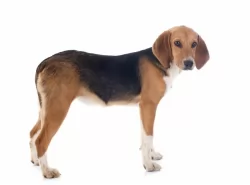 The Beagle Harrier, the breed that was made mixing the France Scent Hounds and a Beagle.
It is not quite sure if this breed was made on purpose or the mix of the breeds happened and resulted in a great dog so the breeding continued.
Since they are not large dogs as hounds, they are used to hunt small animals.
The Beagle Harrier, the breed that was made mixing the France Scent Hounds and a Beagle.
It is not quite sure if this breed was made on purpose or the mix of the breeds happened and resulted in a great dog so the breeding continued.
Since they are not large dogs as hounds, they are used to hunt small animals.
This first breeding took place in England, but after the 14th century, they were breed on purpose in France.
 The long, flocked white coat doesn’t have an undercoat and the large, round, dark eyes peer out of a cloud of white hair. His hair sheds very little and some owners of the Bolognese like to keep the woolly hair texture trimmed. He has black nails and a largish black nose. He is a small dog, with the male standing between 27–30cm and the female being slightly smaller.
The long, flocked white coat doesn’t have an undercoat and the large, round, dark eyes peer out of a cloud of white hair. His hair sheds very little and some owners of the Bolognese like to keep the woolly hair texture trimmed. He has black nails and a largish black nose. He is a small dog, with the male standing between 27–30cm and the female being slightly smaller.
These little dogs weigh in at about 4kg. A toy breed, he is considered to be a true companion dog. He is compact and squarely built with his floppy ears set high on his head. The long tail is carried curved over the dog’s back.
He is a friendly, social dog and can very easily become a typical lap-dog because he just craves human companionship. He wants to be with you and close to your side, whether you live in the city or in the countryside – he adapts to life wherever you are.
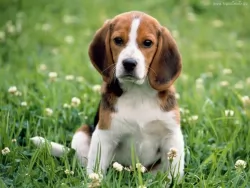 The Beagle Harrier is a scent hound that is described as a big sized Beagle or a small sized Harrier. This breed was developed from this two breeds, actually. Despite the looks of these breeds, the Beagle Harrier is an energetic kind of dog who gets very attached to his family. This medium sized pet comes in variations of colours and they are usually tricoloured. They usually have dark coloured eyes, white paws, and They usually grow up to have a very muscular body, but, if you don’t provide them with the daily activity they need, they will quickly get obese and unhappy.
The Beagle Harrier is a scent hound that is described as a big sized Beagle or a small sized Harrier. This breed was developed from this two breeds, actually. Despite the looks of these breeds, the Beagle Harrier is an energetic kind of dog who gets very attached to his family. This medium sized pet comes in variations of colours and they are usually tricoloured. They usually have dark coloured eyes, white paws, and They usually grow up to have a very muscular body, but, if you don’t provide them with the daily activity they need, they will quickly get obese and unhappy.
 The Bolognese is an easy-going, playful, intelligent little dog who will respond well to training and socialization. He can actually become calm and docile dog, although never dull as he can sometimes act like a clown and be quite entertaining. He makes a wonderful pet and becomes a loyal and devoted companion to adults and children.
The Bolognese is an easy-going, playful, intelligent little dog who will respond well to training and socialization. He can actually become calm and docile dog, although never dull as he can sometimes act like a clown and be quite entertaining. He makes a wonderful pet and becomes a loyal and devoted companion to adults and children.
Non-aggressive by nature, he will be friends with other pets in the home too. He is a small dog, so he isn’t going to be highly active and therefore won’t need loads of exercise, although he will love to go for a walk with you. He’ll also want to have games with the ball. He is such an amicable little dog and will easily adapt to life in the city or country, so long as he can be loved and cherished by his owners.
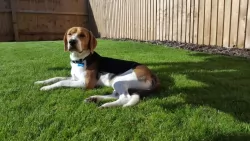 The Beagle Harrier, if trained properly and socialized while he was still a pup, will be the great playmate for any child. They get along with strangers, as well. We might say that they will get along with anybody who is ready to run and play with him. Children are most likely that kind of playdate, so it appears that they like children more. The Beagle Harrier is a great family pet, and he is great with babies, toddlers, teenagers… so don’t be afraid to leave the dog alone during the playdate!
The Beagle Harrier, if trained properly and socialized while he was still a pup, will be the great playmate for any child. They get along with strangers, as well. We might say that they will get along with anybody who is ready to run and play with him. Children are most likely that kind of playdate, so it appears that they like children more. The Beagle Harrier is a great family pet, and he is great with babies, toddlers, teenagers… so don’t be afraid to leave the dog alone during the playdate!
hunting, scent tracking, search dog
Some will say that the Beagle Harrier is one of the most desirable pets because of his loving and lively nature. They get along with almost anyone and they don’t mind living indoors if you have the time to take him out for a daily run each day. They will do great in a large group of people and any public places so you can take your Beagle Harrier with you anywhere you go.
Since the Beagle Harrier is placed in a group of the hound dogs, you must be aware that he will have the attitude of the pack leader. Once you got the Beagle Harrier puppy, you must start training and socializing him in order to grow the pet that will be easy to handle and accepted by the family and all the people around you, even strangers. They are very intelligent and they have a calm nature so they will be quite easy to train.
 Because this particular dog breed is uncommon, you won’t find many details on his health problems. When he is well looked after, he can reach 14 years of age. The Bolognese is from the Bichon Frise family so you can expect similar health problems, and also because he is a pedigree dog.
Because this particular dog breed is uncommon, you won’t find many details on his health problems. When he is well looked after, he can reach 14 years of age. The Bolognese is from the Bichon Frise family so you can expect similar health problems, and also because he is a pedigree dog.
Skin problems – battling with itchy skin conditions are a typical problem with the Bolognese.
Ear infections are common because of a lot of hair in the ear which can collect dirt.
Eye diseases - cataracts which can eventually lead to blindness.
Other health problems to watch for are heart disease, and epilepsy. Periodontitis is something you want to keep an eye on too because the small jaw is prone to developing periodontal infection which can lead to tooth loss.
Remember if you don’t want your Bolognese to be a parent, neutering and spaying provides major health benefits for your dogs.
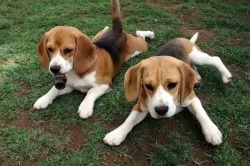 Almost every active dog suffers from joint diseases. Even though it’s generally a genetic disease, you can lower the chances of hip or elbow dysplasia by taking care of your dog’s weight, diet and daily exercise.
Almost every active dog suffers from joint diseases. Even though it’s generally a genetic disease, you can lower the chances of hip or elbow dysplasia by taking care of your dog’s weight, diet and daily exercise.
The Beagle Harrier has big ears that are always set down. That makes them ideal for the dirt accumulation, ear irritations and ear infections. Check his ears regularly and clean them at least once a week.
 The little Bolognese isn’t a big shedder so he isn’t a high maintenance pet. His long cloud of white hair can’t just be left though, because it will become tangled and dirty. Get the right grooming tools because his hair will require a good brushing every 2nd day or so. Professional grooming will also be required to keep his coat in tip-top condition.
The little Bolognese isn’t a big shedder so he isn’t a high maintenance pet. His long cloud of white hair can’t just be left though, because it will become tangled and dirty. Get the right grooming tools because his hair will require a good brushing every 2nd day or so. Professional grooming will also be required to keep his coat in tip-top condition.
You may want to use commercially manufactured dog food from leading brands recommended by your vet for small breed dogs. There is absolutely nothing wrong with that, but just like you want some variety in your diet, so does your pet.
Rice, meat and vegetables can be added into his food now and then as well as ensuring he has some raw meat in his diet. This is important if you want to ensure the health of your dog. Never leave your pet without a constant supply of fresh, cool water.
You can actually buy pet ear cleaners but you have to very careful not to go too deep into your pet’s ears as this can cause damage.
Brush your dog’s teeth a couple of times a week. Never use human toothpaste. You can buy special dog’s toothpaste and toothbrush.
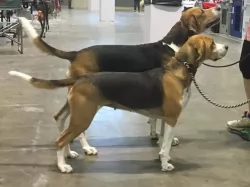 Since the Beagle Harrier is an active dog breed, they will need food for the active dogs. Make sure you provide them with quality food that will give them enough strength to get through the very active day, and not gain too much of the weight. It is very important that you don’t overfeed him because this breed quickly becomes obese. It is advisable to use treats while you train him to do new tricks, but be very careful with the amount you give to the dog.
Since the Beagle Harrier is an active dog breed, they will need food for the active dogs. Make sure you provide them with quality food that will give them enough strength to get through the very active day, and not gain too much of the weight. It is very important that you don’t overfeed him because this breed quickly becomes obese. It is advisable to use treats while you train him to do new tricks, but be very careful with the amount you give to the dog.
Puppies need to be fed only two times a day. Once you decide which brand of food you will use, stick with them until the dog is 6 months old. Make sure they have enough nutrients and the quality ingredients that will help them with growing strong and healthy bones.
If you want Beagle Harrier to grow up in a happy and healthy dog, make sure you provide him with quality food, lots of exercises and unconditional love. They are extremely loving and they get depressed if left alone. Grooming tips are very clear – they need a regular brush because shed a lot. The more you brush, the less hair you will find on your hands during the belly rubs.
If your Beagle Harrier is trained and socialized, the dog park will be the best daily activity for him. If there is no dog park near your house, take him to the bike ride, jogging, swimming, hiking, markets, parks… They love to be off the leash and with people but since they are the hound dogs, don’t be surprised if they get distracted by smelling something more interesting than the ball. They would love to grow up in a house with a large yard, but, if you live in the apartment, make sure that you take time for his daily activity.